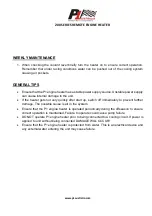
200 SERIES REMOTE ENGINE HEATER
www.p1australia.com
The P1 Engine heater is designed to create cooling system temperature prior to starting the
engine. It is not designed to heat the engine to normal operating temperature.
INSTALLATION INSTRUCTIONS
PREPARING THE P1 ENGINE HEATER
After removing the engine heater from packaging ensure that the -8 fittings are securely installed
to the remote engine heater with thread sealant to prevent coolant leakage. This should be done
at the factory but CHECK!
1. Install -8 lines to remote engine heater
2. Install 1 x -8 quick release fitting to outlet hose. Direction of flow is indicated on the remote
engine heater with an ARROW.
3. Fill remote engine heater with coolant via the inlet hose until full ensuring all air is
exhausted from the remote engine heater.
4. Once filled with coolant install the remaining quick release fitting to hose. This will then
“seal” the system until connected to the engine.
CONNECTING THE P1 ENGINE HEATER TO THE ENGINE
Ensure that the outlet hose from the heater connects to the furthest and lowest point on the engine
block.
When connected to the engine system ensure that the heater is 20-40cm below the highest point
in the cooling system.
Connect hoses to remote engine mounting via quick release fittings ensuring that fittings are
securely engaged and locked. FAILURE to connect can cause coolant loss.
1. Connect power cable to power source and switch on.
2.
Once power is applied to unit a “buzz” may be heard indicating that the heater pump is
operating. This may decrease after a “run in” period but is normal.
3. If the remote engine heater stops working after only a few seconds this will be due to air
present in the system. Evacuate all the air from the system and proceed with caution.
Failure to evacuate air from the system WILL CAUSE PUMP FAILURE!
**Any leaks in the cooling system will cause pump failure!**




















